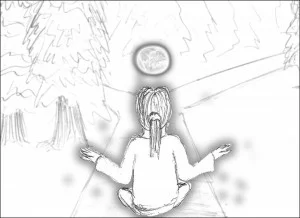 Is it more than coincidence that the quintessential American holiday — Thanksgiving — represents, at a deep level, precisely what the American people now so direly need in order to heal their souls? I think not.
Is it more than coincidence that the quintessential American holiday — Thanksgiving — represents, at a deep level, precisely what the American people now so direly need in order to heal their souls? I think not.
Think about it. Today, Western culture, and especially American culture, revolves around cultivating and enshrining a chronic attitude of dissatisfaction. We are brought up, inculcated day and night by media and almost everyone we know, to believe it is just natural, even a virtue, to want more — more food, more possessions, more power, more achievement, more money, more entertainment, more love, more friends, more success, more fame, more status. In fact, a person who rejects this view would likely be seen as downright “unAmerican” by most people! Maybe each of us doesn’t desire all of these things, but most of us crave more of some of them. As a result, a constant sense of dissatisfaction is gnawing at our souls and creating an epidemic of depression in its wake. It is the disease of our times, and oddly enough, Thanksgiving might be the cure we need.
Of course, when I talk about Thanksgiving, I’m referring to something much more profound than our current conception of the American holiday. In fact, the way we celebrate Thanksgiving today is the exact opposite of what we should be doing — gorging ourselves on so much food that many of us become sick afterwards! On top of this, we are then encouraged to go on a spending spree the next day, Black Friday, that is so insanely intense that people die each year being trampled in store lines. Sure, some of us might indulge a bit in the “giving” part of the holiday and throw a few cans in the collection bin for the hungry, but how many of us truly engage in the “Thanks” part?
There are at least two steps to experiencing true gratitude. Naturally, there is the act of giving thanks. But a prerequisite to true thankfulness is to first deeply acknowledge what you have. Indeed, this step might be the harder of the two. You may intellectually “know” you have various things, but how deeply do you feel it? It is essential to do so, because without deeply acknowledging what’s actually in your cup, you will always feel thirsty for more. And as a result, the practice of gratitude will be fleeting.
Right now — take a few moments and consider all that you have and try to acknowledge it. Write it down. Say it out loud. Feel it! Include not only food, material possessions, and the natural wonders that surround you, but everything else too — the friends you have, the love and other kindnesses you receive — big or small, and also the achievements you have manifested in your life (this one can be particularly hard!).
For an even deeper examination of this issue, you might now consider what it is that you crave. Craving is all about having enough but not seeing that you do. It is thinking you haven’t eaten enough when you’ve already stuffed yourself (or wanting to lose more weight when you are already unhealthfully thin), buying more and more things when you already have plenty, wanting more money when you are already rich, or wanting more fame or recognition when you are already famous and recognized. In essence, craving is a delusion about the nature of your reality, and it is usually rooted in a sense of inner lack — often some kind of lack experienced in childhood. For this reason, it is hard to release cravings. They are deeply ingrained habits of being. But they are also the root of some of our deepest suffering.
Why not take this Thanksgiving as an opportunity to ponder your personal forms of craving? Below are some strategies to try to address a craving of “X”:
Is your craving of X based on current reality? Or it merely a habit?
Examine your current life. Do you actually have enough of X?
Is your craving for X really symptomatic of some other deeper feeling of lack — for something else? Let’s call it “Y”. Perhaps Y is feeling loved or “seen”. Most likely this feeling of lack is rooted in some experience of the past. Now examine your current life. Do you actually lack Y now?
Can you substitute something else for your craving of X?
Sometimes when a person craves a particular food, they also suffer from an illness that is actually caused by that food. Substituting the problem food with something else can often be the route to cure. Along the same lines, addictions to certain substances (also the root of disease) can be alleviated through substitutions. Can you find some form of substitute for X?
Experiment with giving X rather than craving X.
What would happen if you gave love instead of craved it?
Gave recognition to your peers, rather than craving it from them?
Gave away some of your possessions instead of buying more?
Cultivate the outward-flowing energy of thankfulness and gratitude.
Craving is all about pulling things toward you. Gratitude is about sending energy outward. By practicing regular gratitude meditations, or by writing a list each morning (or before bed each night) of all the things you are grateful for, you can greatly reduce the chronic sense of dissatisfaction and craving in your life. Try it!


